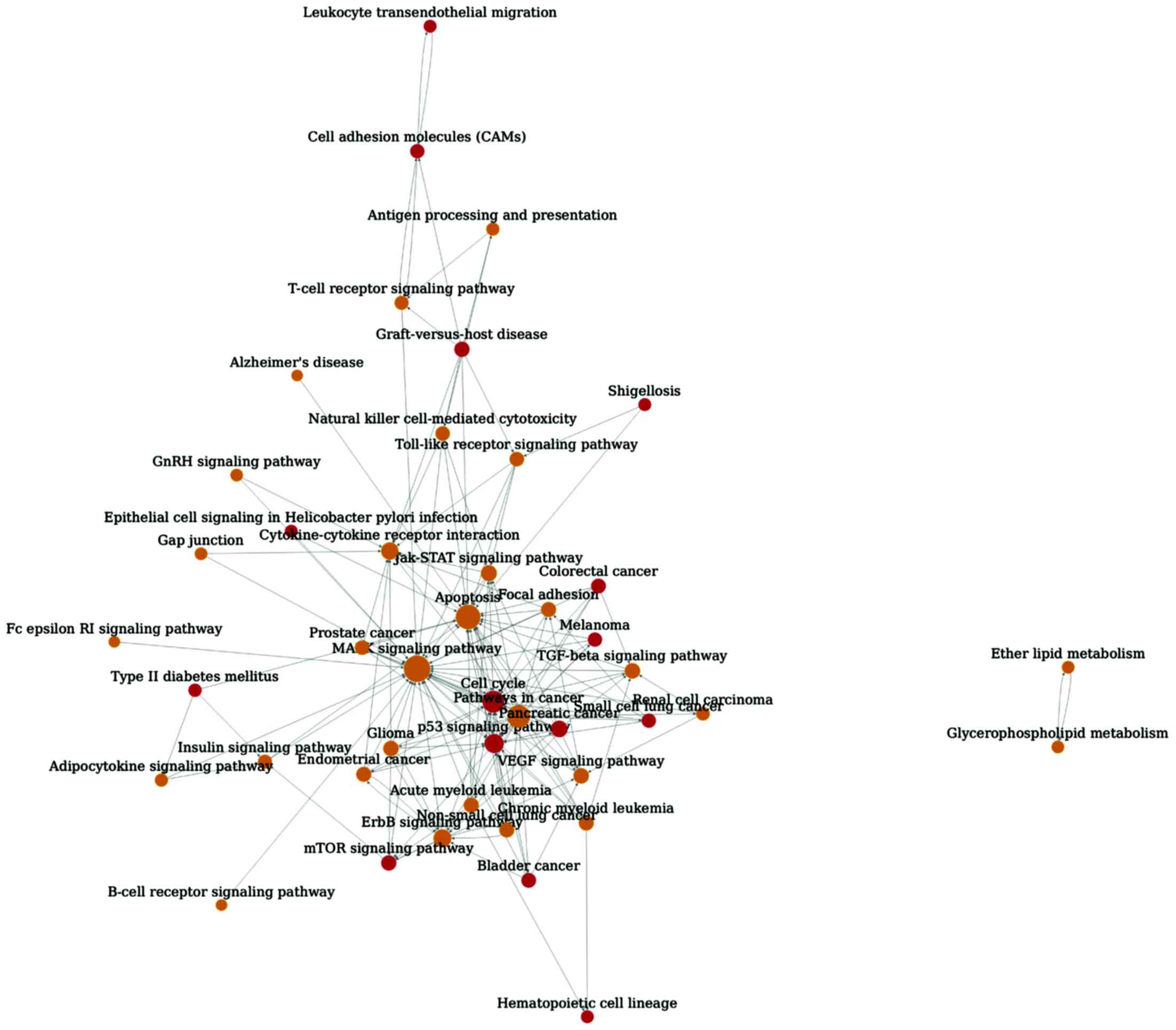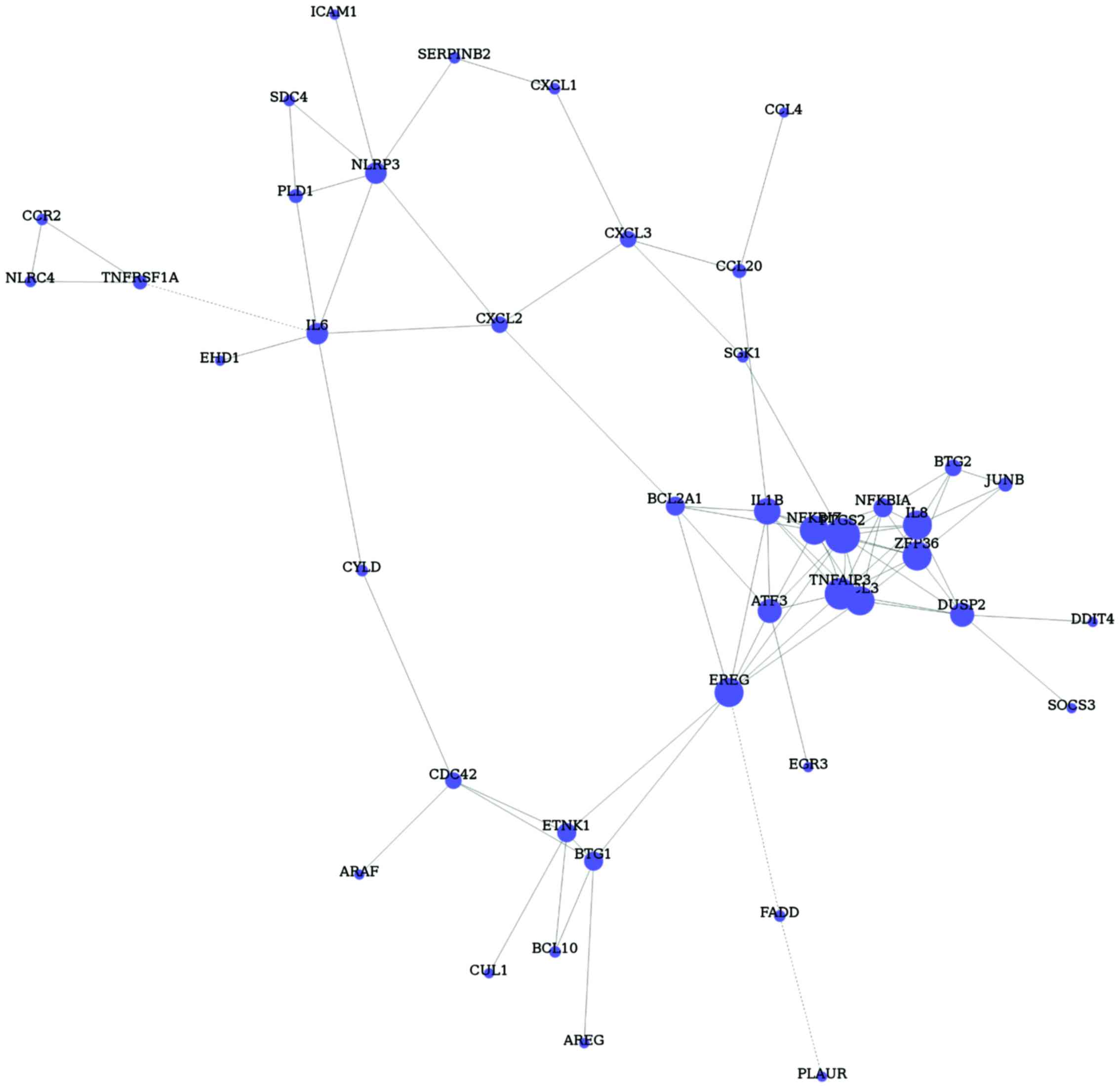|
1
|
Collins P: Risk factors for cardiovascular
disease and hormone therapy in women. Heart. 92 Suppl
3:iii24–iii28. 2006. View Article : Google Scholar : PubMed/NCBI
|
|
2
|
Urban PP, Wicht S, Vukurevic G, Fitzek C,
Fitzek S, Stoeter P, Massinger C and Hopf HC: Dysarthria in acute
ischemic stroke: lesion topography, clinicoradiologic correlation,
and etiology. Neurology. 56:1021–1027. 2001. View Article : Google Scholar : PubMed/NCBI
|
|
3
|
Chen WC, Cheng HC and Datsen GW:
Pharmaceutical composition for preventing/treating brain injury and
enhancing recovery of sequelae and manufacture thereof. US Patent
US 20150290272 A1. Filed April 9, 2015; issued October 15.
2015.
|
|
4
|
Wong CB and Wong JC: A novel method to
quantify carotid artery stenosis by Doppler ultrasound: Using the
continuity principle. Int J Angiol. 19:e86–e90. 2010. View Article : Google Scholar : PubMed/NCBI
|
|
5
|
Kunze E, Pham M, Raslan F, Stetter C, Lee
JY, Solymosi L, Ernestus RI, Vince GH and Westermaier T: Value of
perfusion CT, transcranial doppler sonography, and neurological
examination to detect delayed vasospasm after aneurysmal
subarachnoid hemorrhage. Radiol Res Pract.
2012:2312062012.PubMed/NCBI
|
|
6
|
Gretarsdottir S, Thorleifsson G,
Reynisdottir ST, Manolescu A, Jonsdottir S, Jonsdottir T,
Gudmundsdottir T, Bjarnadottir SM, Einarsson OB, Gudjonsdottir HM,
et al: The gene encoding phosphodiesterase 4D confers risk of
ischemic stroke. Nat Genet. 35:131–138. 2003. View Article : Google Scholar : PubMed/NCBI
|
|
7
|
Xia CF, Yin H, Borlongan CV, Chao L and
Chao J: Kallikrein gene transfer protects against ischemic stroke
by promoting glial cell migration and inhibiting apoptosis.
Hypertension. 43:452–459. 2004. View Article : Google Scholar : PubMed/NCBI
|
|
8
|
Liu J, Cheng J, Peng J, Han S, Yu L and
Nie S: Effects of polymorphisms of heat shock protein 70 gene on
ischemic stroke, and interaction with smoking in China. Clin Chim
Acta. 384:64–68. 2007. View Article : Google Scholar : PubMed/NCBI
|
|
9
|
Li N, He Z, Xu J, Liu F, Deng S and Zhang
H: Association of PDE4D and IL-1 gene polymorphism with ischemic
stroke in a Han Chinese population. Brain Res Bull. 81:38–42. 2010.
View Article : Google Scholar : PubMed/NCBI
|
|
10
|
Bhat VM, Cole JW, Sorkin JD, Wozniak MA,
Malarcher AM, Giles WH, Stern BJ and Kittner SJ: Dose-response
relationship between cigarette smoking and risk of ischemic stroke
in young women. Stroke. 39:2439–2443. 2008. View Article : Google Scholar : PubMed/NCBI
|
|
11
|
Klatsky AL, Armstrong MA, Friedman GD and
Sidney S: Alcohol drinking and risk of hospitalization for ischemic
stroke. Am J Cardiol. 88:703–706. 2001. View Article : Google Scholar : PubMed/NCBI
|
|
12
|
Barr TL, Conley Y, Ding J, Dillman A,
Warach S, Singleton A and Matarin M: Genomic biomarkers and
cellular pathways of ischemic stroke by RNA gene expression
profiling. Neurology. 75:1009–1014. 2010. View Article : Google Scholar : PubMed/NCBI
|
|
13
|
Krug T, Gabriel JP, Taipa R, Fonseca BV,
Domingues-Montanari S, Fernandez-Cadenas I, Manso H, Gouveia LO,
Sobral J, Albergaria I, et al: TTC7B emerges as a novel risk factor
for ischemic stroke through the convergence of several genome-wide
approaches. J Cereb Blood Flow Metab. 32:1061–1072. 2012.
View Article : Google Scholar : PubMed/NCBI
|
|
14
|
Smita S, Katiyar A, Pandey DM, Chinnusamy
V, Archak S and Bansal KC: Identification of conserved drought
stress responsive gene-network across tissues and developmental
stages in rice. Bioinformation. 9:72–78. 2013. View Article : Google Scholar : PubMed/NCBI
|
|
15
|
Kutalik Z, Inwald J, Gordon SV, Hewinson
RG, Butcher P, Hinds J, Cho KH and Wolkenhauer O: Advanced
significance analysis of microarray data based on weighted
resampling: A comparative study and application to gene deletions
in Mycobacterium bovis. Bioinformatics. 20:357–363. 2004.
View Article : Google Scholar : PubMed/NCBI
|
|
16
|
Blake JA and Harris MA: The Gene Ontology
(GO) project: Structured vocabularies for molecular biology and
their application to genome and expression analysis. Curr Protoc
Bioinformatics: Chapter 7. Unit 7.2. 2008. View Article : Google Scholar
|
|
17
|
Jing LS, Shah FF, Mohamad MS, Hamran NL,
Salleh AH, Deris S and Alashwal H: Database and tools for metabolic
network analysis. Biotechnol Bioprocess Eng. 19:568–585. 2014.
View Article : Google Scholar
|
|
18
|
Shah RS and Cole JW: Smoking and stroke:
The more you smoke the more you stroke. Expert Rev Cardiovasc Ther.
8:917–932. 2010. View Article : Google Scholar : PubMed/NCBI
|
|
19
|
Kosaka T, Miyata A, Ihara H, Hara S,
Sugimoto T, Takeda O, Takahashi E and Tanabe T: Characterization of
the human gene (PTGS2) encoding prostaglandin-endoperoxide synthase
2. Eur J Biochem. 221:889–897. 1994. View Article : Google Scholar : PubMed/NCBI
|
|
20
|
Hu HM, Kuo CH, Lee CH, Wu IC, Lee KW, Lee
JM, Goan YG, Chou SH, Kao EL, Wu MT, et al: Polymorphism in COX-2
modifies the inverse association between Helicobacter pylori
seropositivity and esophageal squamous cell carcinoma risk in
Taiwan: A case control study. BMC Gastroenterol. 9:372009.
View Article : Google Scholar : PubMed/NCBI
|
|
21
|
Zeldin D: The G-765C promoter polymorphism
in cyclooxygenase-2 (PTGS2), aspirin utilization and cardiovascular
disease risk: The Atherosclerosis Risk in Communities (ARIC) study.
Pharmacotherapy. 26:e872006.
|
|
22
|
Nadjar A, Tridon V, May MJ, Ghosh S,
Dantzer R, Amédée T and Parnet P: NFkappaB activates in vivo the
synthesis of inducible Cox-2 in the brain. J Cereb Blood Flow
Metab. 25:1047–1059. 2005. View Article : Google Scholar : PubMed/NCBI
|
|
23
|
Liu W, Wang X, Zheng Y, Shang G, Huang J,
Tao J and Chen L: Electroacupuncture inhibits inflammatory injury
by targeting the miR-9-mediated NFκB signaling pathway following
ischemic stroke. Mol Med Rep. 13:1618–1626. 2016. View Article : Google Scholar : PubMed/NCBI
|
|
24
|
Lodolce JP, Kolodziej LE, Rhee L, Kariuki
SN, Franek BS, McGreal NM, Logsdon MF, Bartulis SJ, Perera MA,
Ellis NA, et al: African-derived genetic polymorphisms in TNFAIP3
mediate risk for autoimmunity. J Immunol. 184:7001–7009. 2010.
View Article : Google Scholar : PubMed/NCBI
|
|
25
|
Vereecke L, Beyaert R and van Loo G:
Genetic relationships between A20/TNFAIP3, chronic inflammation and
autoimmune disease. Biochem Soc Trans. 39:1086–1091. 2011.
View Article : Google Scholar : PubMed/NCBI
|
|
26
|
Hung YY, Lin CC, Kang HY and Huang TL:
TNFAIP3, a negative regulator of the TLR signaling pathway, is a
potential predictive biomarker of response to antidepressant
treatment in major depressive disorder. Brain Behav Immun.
59:265–272. 2017. View Article : Google Scholar : PubMed/NCBI
|
|
27
|
Bouchard L, Tchernof A, Deshaies Y,
Marceau S, Lescelleur O, Biron S and Vohl MC: ZFP36: A promising
candidate gene for obesity-related metabolic complications
identified by converging genomics. Obes Surg. 17:372–382. 2007.
View Article : Google Scholar : PubMed/NCBI
|
|
28
|
Seet RC, Zhang Y, Wijdicks EF and
Rabinstein AA: Impact of obesity and metabolic syndrome in stroke
patients undergoing intravenous thrombolysis. Stroke.
43:A1562012.
|
|
29
|
Kurl S, Laukkanen JA, Rauramaa R, Lakka
TA, Sivenius J and Salonen JT: Systolic blood pressure response to
exercise stress test and risk of stroke. Stroke. 32:2036–2041.
2001. View Article : Google Scholar : PubMed/NCBI
|
|
30
|
O'Connell JE and Gray CS: The stress
response to acute stroke. Stress Health. 7:239–243. 1991.
|
|
31
|
Heeschen C, Chang E, Aicher A and Cooke
JP: Endothelial progenitor cells participate in nicotine-mediated
angiogenesis. J Am Coll Cardiol. 48:2553–2560. 2006. View Article : Google Scholar : PubMed/NCBI
|
|
32
|
Wei L, Keogh CL, Whitaker VR, Theus MH and
Yu SP: Angiogenesis and stem cell transplantation as potential
treatments of cerebral ischemic stroke. Pathophysiology. 12:47–62.
2005. View Article : Google Scholar : PubMed/NCBI
|
|
33
|
Oonuma T, Morimatsu M, Ochiai K, Iwanaga T
and Hashizume K: Role of NF-kappaB in constitutive expression of
MAIL in epidermal keratinocytes. J Vet Med Sci. 69:279–284. 2007.
View Article : Google Scholar : PubMed/NCBI
|
|
34
|
Ishiguro-Oonuma T, Ochiai K, Hashizume K,
Iwanaga T and Morimatsu M: NFKBIZ regulates the proliferation and
differentiation of keratinocytes. Jpn J Vet Res. 63:107–114.
2015.PubMed/NCBI
|
|
35
|
Jin R, Song Z, Yu S, Piazza A, Nanda A,
Penninger JM, Granger DN and Li G: Phosphatidylinositol-3-kinase
gamma plays a central role in blood-brain barrier dysfunction in
acute experimental stroke. Stroke. 42:2033–2044. 2011. View Article : Google Scholar : PubMed/NCBI
|
















